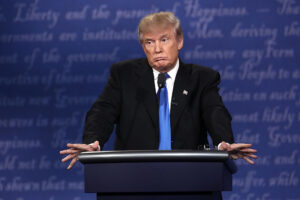
(Photo by Win McNamee/Getty Images)
Yesterday Donald Trump made good on his threat to assert executive privilege, suing Select Committee Chair Bennie Thompson and the National Archivist to block subpoenas regarding the January 6 investigation.
Attorney Jesse Binnall, who worked with Sidney Powell on Michael Flynn’s case and spearheaded Trump’s doomed election suits in Nevada, filed the instant complaint in DC. And indeed the pleading shares a certain joie de vivre and insouciant disregard for cogent legal theory and the space-time continuum with Binnall’s prior output.

Skills That Set Firms Apart
Legal expertise alone isn’t enough. Today’s most successful firms invest in developing the skills that drive collaboration, leadership, and business growth. Our on-demand, customizable training modules deliver practical, high-impact learning for attorneys and staff—when and where they need it.
“[I]n cases like this, where a committee has declined to grant sufficient time to conduct a full review, there is a longstanding bipartisan tradition of protective assertions of executive privilege designed to ensure the ability of the Executive to make a final assertion, if necessary, over some or all of the requested material,” he argues, seemingly oblivious of the fact that “the Executive” is Pres. Joe Biden, and he had no difficulty making a privilege determination on the Committee’s timeline.
But when the facts and the law are against you …
“The United States House Select Committee to Investigate the January 6th Attack on the United States Capitol (the ‘Committee’) has decided to harass President Trump and senior members of his administration (among others) by sending an illegal, unfounded, and overbroad records request to the Archivist of the United States,” the complaint begins, launching into ten pages of histrionics, accusing the Committee of engaging in a “vexatious, illegal fishing expedition openly endorsed by Biden and designed to unconstitutionally investigate President Trump and his administration.”
“In a political ploy to accommodate his partisan allies, President Biden has refused to assert executive privilege over numerous clearly privileged documents requested by the Committee,” howls the man who spent four years loudly asserting that executive privilege was an awesome, unreviewable power resting solely in the discretion of the executive.
Which laws? Well, the plaintiff is somewhat less clear on that one.
He begins by arguing that there is no legitimate legislative purpose in Congress figuring out who attacked it, for this is solely the purview of law enforcement.
“Investigations are permissible only insofar as they further some legitimate legislative purpose,” the complaint notes, referring to Trump v. Mazars, in which the court adjudicated the House subpoena for the sitting president’s financial documents. It’s an odd precedent to cite, since the ruling both affirmed Congress’s legitimate oversight role and was predicated on the separation of powers.
But now Trump himself has been separated from power, and as a private citizen his arguments about the special degree of deference due to the executive make very little sense. It really takes chutzpah to argue that the court should block all subpoenas for some indeterminate amount of time because Donald Trump is far too busy to make individualized privilege determinations in the 30 days specified by the Presidential Records Act. “[The burden should not be placed on the President of ‘critiquing the unacceptable discovery requests line by line,'” the complaint argues, citing a 2004 case involving Vice President Dick Cheney, who was unfortunately very busy in the White House at the time.
And speaking of chutzpah, Trump cites a memo by Pres. Bill Clinton’s Attorney General Janet Reno to justify his right to invoke a “protective privilege” over any further compliance by the archivist with congressional subpoenas, allowing him an indefinite period — perhaps until after the 2022 midterms? — to evaluate the requested documents for privileged material. Reno was, of course, addressing the sitting president, not some random dude on a golf course.
As for the Presidential Records Act, Trump both relies on it as codifying his right to assert executive privilege as a private citizen, and demands that the Court strike it down as unconstitutional.
The whole thing is gobbledygook. It’s $402-worth of sand in the Committee’s gears, but it’ll probably work. With an assist from the Supreme Court, Trump was able to keep his tax returns and Don McGahn’s testimony under wraps for two years. So judged solely as a cynical delay tactic, this pleading is probably fine. As a piece of legal writing, though … not so much.
Trump v. Thompson [Docket via Court Listener]
Elizabeth Dye lives in Baltimore where she writes about law and politics.
